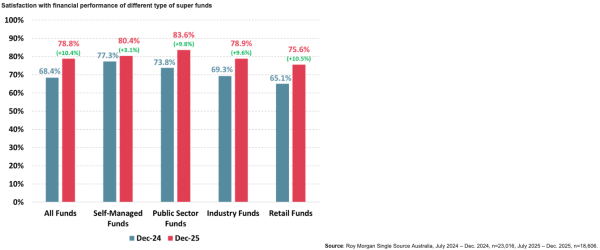Confirmed: FY super returns turn negative

It has been confirmed: Superannuation fund returns ended the financial year in negative territory for only the fifth year since the inception of the superannuation guarantee in 1992.
According to the financial year assessment issued by SuperRatings the median balanced option is estimated to finish the financial year at negative 3.3% largely as a result of market turbulence driven by factors such as the war in Ukraine and the continuing pandemic.
Commenting on the financial year assessment, SuperRatings executive director, Kirby Rappell said funds had experienced a challenging second half, effectively drgging down a solid first half.
“This was the 5th negative return for balanced options we have seen since the introduction of super 30 years ago; however, it follows the second highest annual return of 17.8% in 2021. So, when you look at it over the last two years, members’ balances are up,” he said.
“Superannuation is a long-term investment and funds continue to provide strong long-term returns on average and have outperformed the typical CPI+3.0% investment objective. When you consider that share markets are down around 10-12% across Australia and globally, super funds have done well to prevent some of the steep falls that we have seen from being passed through to members’ super account balances.”
According to the SuperRatings analysis the median balanced option declined by an estimated -3.4% over June, while the median growth option reduced by an estimated -4.4%. While capital stable options which hold more traditionally defensive assets such as cash and bonds only fell by an estimated -1.7%.
“Members should prepare for continued volatility with a rocky road ahead for investment markets,” Rappell said. “If you are not approaching or in retirement, keep in mind that all market movements in the short term are not the real story as you can’t access your money now. You only realise that loss if you switch investment options or take your money out, which would take away the opportunity to participate in any future recovery.”
“Whereas the current situation is more concerning for those nearing or in retirement. Typically, we see these members sitting in investment options which are less exposed to these market movements which lessens the impact of the bumps. The silver lining of the recent interest rate rises is it will help those deriving an income from fixed income assets, following the anaemic cash rate levels we have seen in recent years.”











For our two adviser practice we have all the costs listed plus at least one FTE costing another $70k plus…
It's perverse and sick. Bleeding the private advisers who want to help clients WITHOUT product ties, by consumer groups co-funded…
Talk about fees for no service, these parasites will kill the profession after hosting on us till they die of…
85% increase in freaking Govt Red Tape in the last 15 years. And somehow the clown show in Canberra have…
This article covers some of the financial costs. I believe the useless red-tape the government (and their bureaucrats) have imposed…